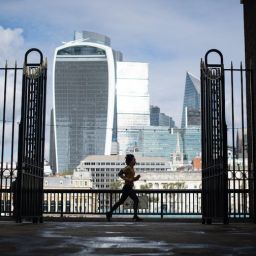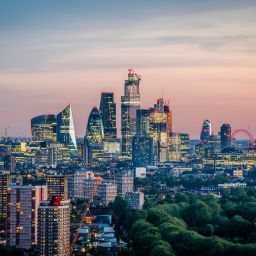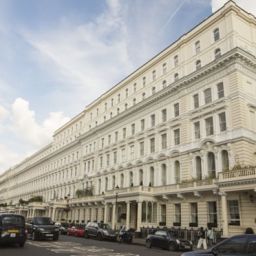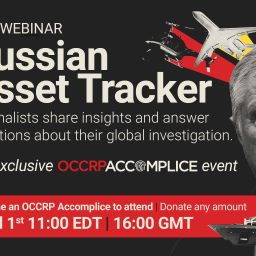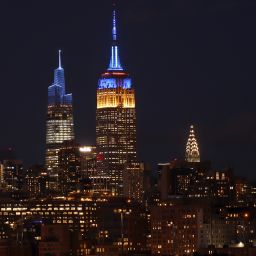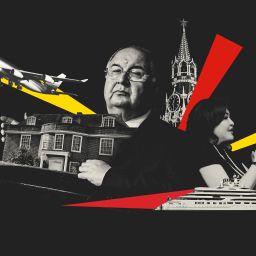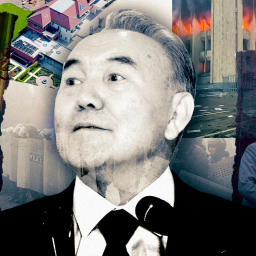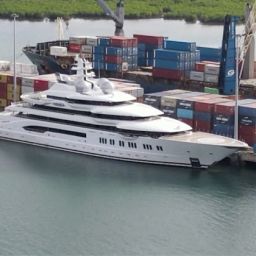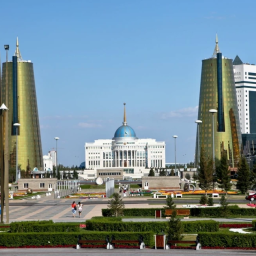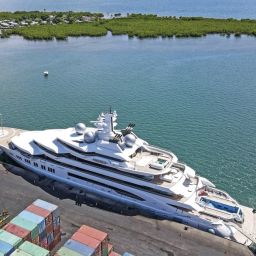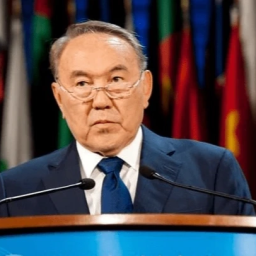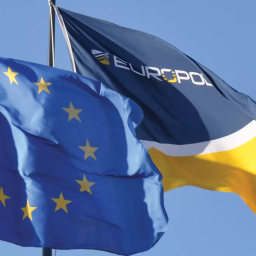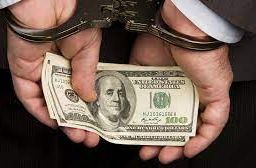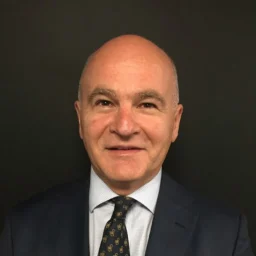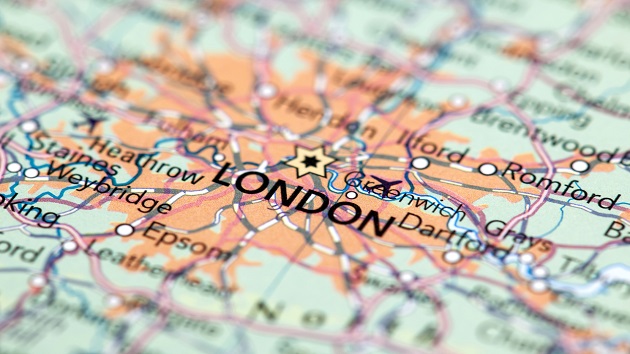
(LONDON) — To Daria Kaleniuk, a Ukrainian anti-corruption activist, Russian President Vladimir Putin “has two armies.”
“One is visible and obvious, it operates in Ukraine,” Kaleniuk said Wednesday during a congressional hearing in Washington. “But another army is invisible.”
As Ukrainian forces fight to defend their country from Russia’s protracted invasion, experts say a second battle is being waged in London. In the 22 years since Putin swept into power, many in Russia’s billionaire class have gone abroad. Critics say in many cases it is to launder their money and reputation, finding a home in friendly real estate markets and cultural hubs. Now, the wealth they’ve amassed abroad has come under great scrutiny.
According to the anti-corruption NGO Transparency International, at least £1.5 billion ($1.9 billion) worth of U.K. property is owned by Russians with links to the Kremlin or those suspected of financial crime. Due to the prevalence of opaque, offshore companies, the true scale of illicit wealth is likely far higher, hence the capital city’s nickname in some quarters: “Londongrad.”
Of course, not every wealthy Russian in London is an oligarch or is linked to illicit money. And wealthy oligarchs in London are not uniform in how close they are to Putin and how they accumulated wealth, but many do have in common ties to the Russian state, according to Thomas Mayne, an expert in corruption studies and visiting fellow at Chatham House, a London-based think tank.
“It’s a ‘you scratch my back and I’ll scratch yours’ type system,” he told ABC News. “You’re allowed to become unfathomably wealthy. But, on the other hand, you will be required depending on who you are at various times to support whatever the Kremlin wants you to do.”
Roman Abramovich, the now-sanctioned owner of Chelsea F.C., is perhaps the best known of these oligarchs. For almost two decades he enjoyed a privileged position in British society, investing a fortune in the London soccer club, ushering in an unprecedented era of success.
But Abramovich has “had a close relationship for decades” with Putin, according to the British government, which has announced sanctions against a host of oligarchs. Abramovich has repeatedly disputed reports suggesting his alleged closeness to Putin. He has not been sanctioned by the U.S.
The Foreign, Commonwealth and Development Office specifically mentioned Abramovich’s dealings with Evraz PLC, a manufacturing company that is said to be supplying steel to make some Russian tanks used in the war with Ukraine. Abramovich has not commented on the sanctions since they were imposed.
Abramovich has found himself in a bizarre position, and his role at the Ukraine-Russia negotiations — where he suffered a suspected poisoning along with Ukrainian delegates — has been the subject of a great deal of media intrigue.
Another investor in U.K. culture is Russian billionaire Alisher Usmanov, who was the top shareholder of yet another major soccer club, Arsenal, until 2018. He maintained his deep ties to the Premier League until just last month, when Liverpool-based soccer club Everton suspended multimillion-dollar sponsorship deals with Russian companies linked to the oligarch. He was sanctioned by the U.K. shortly after.
The war in Ukraine has thrown London’s role as a hub for Russian money into sharp focus, spurring a response unseen after previous Russian actions, including the poisonings of Russian defectors Sergei Skripal in 2018 and Alexander Litvinenko in 2006, the annexation of Crimea in 2014 and the Georgian war of 2008.
The U.K. has now sanctioned over 1,000 individuals and businesses it says has links to the Russian state, according to the foreign office. The total asset value of the banks sanctioned is upwards of $650 billion, and the total wealth of oligarchs and their families sanctioned is upwards of $190 billion, according to official data.
“These oligarchs, businesses and hired thugs are complicit in the murder of innocent civilians and it is right that they pay the price,” Foreign Secretary Liz Truss said in announcing the latest round of sanctions. “Putin should be under no illusions — we are united with our allies and will keep tightening the screw on the Russian economy to help ensure he fails in Ukraine. There will be no let-up.”
In terms of tackling illicit wealth and corruption of Russian origin, the response has been “robust” and “positive,” Mayne said, though questions remain about the sheer depth of Russian influence in the U.K.
“It’s perhaps surprising simply because of readiness in the last 20 years to accept this corrupt capital, this dirty cash,” he said. “You know, we’ve known for a long time Russia is a bad actor. But the big question is, you know, how did we let this happen in the first place?”
Experts say the assets that have surfaced likely reflect only a fraction of Russian wealth in the U.K. As with elsewhere in the West, many oligarchs and other wealthy individuals from foreign countries have hidden their assets in a complex network of shell companies or under the names of their family members. Critics say future sanction packages should take these loopholes into account.
“In the U.K., sanctioning oligarchs should include visa bans for [the oligarchs themselves] … but also for their family members,” Kaleniuk said during Wednesday’s hearing.
The Organized Crime and Corruption Reporting Project (OCCRP), a network of investigators and journalists, found five properties linked to Usmanov in the U.K., a network of investigators and journalists, estimated to be worth more than $200 million.
In announcing Usmanov’s sanctioning last month, the U.K. government said two of Usmanov’s large properties, Beechwood House, in London, and the 16th century Sutton Place estate, in Surrey, were among his frozen assets. But some of his wealth has proved more elusive — with the OCCRP reporting large portions have been transferred into trusts, out of reach of the British government, with his family holding the beneficial rights.
In 2020, a parliamentary committee released The Russia Report, which was commissioned following the poisoning of Skripal on the streets of Salisbury with a Novichok agent. Skripal and his daughter survived, though one other British national died and another became severely ill.
The report, which was critical of government measures to combat Russian influence, said many Russians with links to Putin had integrated into London’s “business and social scene,” some with connections to the “highest levels” of British politics. Lawyers, accountants and estate agents helped enable Russian influence, it added, describing it as the “new normal.”
A Golden visa scheme, guaranteeing residency for foreign investors, which reportedly helped 2,600 Russian investors in the U.K. since 2008, was only revoked on the eve of the Ukraine war.
“The Russia Report said that the security services have taken their eye off the ball when it came to the threat posed by Russia,” Mayne told ABC News. “And that has to be tied in with the obscene amounts of capital flowing into London from Russia, which they’ve been quite happy to accept, even though it’s been dubiously acquired. Now we’re only realizing that the folly of that position.”
Downing Street officials hope the new wave of sanctions — with potentially more to come — as well as a new Economic Crime Bill, will follow through on Prime Minister Boris Johnson’s warning issued at the outset of war: that those attempting to launder money in the U.K. have “nowhere to hide.”
The U.K. government hopes that targeting Russian oligarchs will have a dual effect: preventing funds from reaching the Kremlin to finance the war in Ukraine, and also curtailing the lavish lifestyles of Russian elites who have enjoyed what their riches can buy them in the West. When the U.K. announced its first seizure of a Russian owned yacht in British waters at the end of last month, Transport Secretary Grant Shapps said it served as a “a clear and stark warning to Putin and his cronies.”
By their nature, sanctions are a “freeze, not a seize,” Mayne said, but the nature of Putin’s government means that targeting individuals could potentially, as the government hopes, have an effect.
The Economic Crime Bill will be paired with a National Security Agency tool, introduced in 2018 to tackle alleged dirty money, called “Unexplained Wealth Orders.” When they have been used they have been high profile — such as to target the wife of a disgraced Azeri banker who went on a major spending spree at Harrod’s — though so far only a handful have been meted out.
In an extract from his new book entitled “Butler to the World” published in The Times of London, financial journalist Oliver Bullough said sanctions will likely be challenged in court. The bill “contains nothing that will help to drive kleptocratic wealth out of this country,” he wrote.
“This really comes back to the question of what London has become, and whether this will truly be a line in the sand,” Mayne said. “Do we just sit back and continue to be happy to accept this money? Or do we start to realize that corruption poses a national security threat as Biden as identified in the U.S.? My suspicion is that, because London is the world’s largest financial center, we will go back to the way it was, with perhaps a bit of a caveat on specifically Russian cash.”
Original source of article: www.deltaplexnews.com
